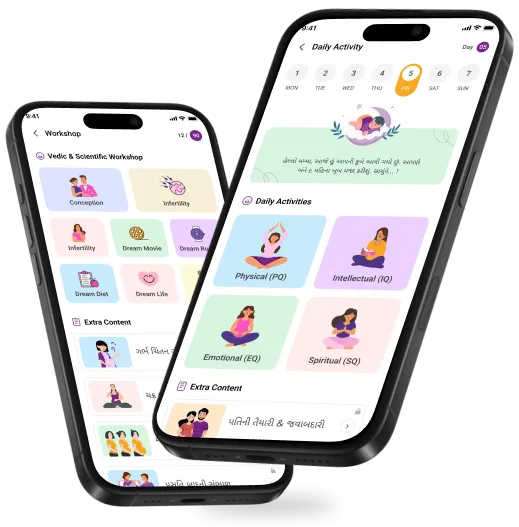Hey there, let's talk about something important: PCOS/PCOD. Don't worry, we're here to break it down for you in the simplest way possible.“PolyCystic Ovary Syndrome (PCOS)” and “PolyCystic Ovary Disorder (PCOD)” are medical conditions commonly found in women of reproductive age due to hormonal imbalance. In this, the level of male hormone – “androgen” – increases in the woman's body and more than one cyst develops in the ovaries.It is important to be aware that these are two separate diseases that are often mistaken for one and the same. Also, it is important to note from the beginning that women have many problems whose symptoms are often similar.
Imagine your body as a complex puzzle, and PCOS/PCOD is just one piece of it. It's like your body's way of saying, "Hey, something's not quite right here." It can cause irregular periods, weight gain, acne, and even difficulty in getting pregnant. But worry not, because with a little understanding and some simple solutions, you can put that puzzle together and feel better than ever.
Imagine going on a roller coaster ride. Sometimes, with PCOS/PCOD, your hormones are like the ups and downs of that roller coaster. They can make you feel happy one moment and sad the next, leaving you feeling emotionally exhausted.But here's the good news: You're not stuck with this puzzle forever. There are plenty of solutions out there to help you feel your best. From making small changes in your daily routine to different treatments, we are here to guide you. So, if you're ready to take control of your health and tackle PCOS/PCOD, you're at the right place. Let's discover how you can live your happiest, healthiest life starting today!
Symptoms of PCOS/PCOD

PCOS is an endocrine/metabolic disorder in which ovaries produce excess of male hormone ‘Androgen’ causing multiple cyst formation. In PCOD the ovaries start releasing immature eggs that lead to hormonal imbalances and swollen ovaries. PCOD is a condition in which ovaries produce many immature or partially mature eggs, this happens due to poor lifestyle, obesity, stress and hormonal imbalance. PCOS/PCOD can cause the following symptoms
- Weight gain
- Irregular periods
- Extra hair growth on body and face
- Problems of acne and oily skin
- Excessive hair fall
- Having trouble conceiving
- Having pelvic pain
Apart from these, high blood pressure, diabetes and imbalance of other hormones can also occur due to its increase. If this problem increases too much then conceiving becomes a big problem for any woman.
Difference Between PCOS & PCOD

Causes of PCOS/PCOD
PCOD/PCOS occurs due to a combination of factors, including your family history, lifestyle, and genetics. Various elements such as genes, insulin metabolism, and hormonal issues all contribute to the development of PCOD/PCOS.
- Unhealthy Diet: A diet that lacks proper nutrition and is high in unhealthy fats and sugars may contribute to the development of PCOD/ PCOS.
- Sedentary Lifestyle: Little to no physical activity can increase the risk of developing PCOS/PCOD.
- Medicines: Certain medicines can cause hormone imbalance and contribute to PCOS/PCOD.
- Genetics: PCOD/PCOS often runs in families.

In addition to these factors, several physiological causes may increase the likelihood of developing PCOD/PCOS:
- Excess Insulin: Insulin is a hormone naturally produced by the pancreas that helps regulate the body's metabolism and blood sugar levels. High insulin levels are a risk factor in development of PCOD/PCOS. Excess insulin can stimulate the production of androgens (male hormones), which can inhibit ovulation.
- Inflammation: Autoimmune conditions and other mild inflammatory processes may contribute to increased androgen levels in the body.
- High Androgen Levels: Having higher levels of androgens in the body, commonly known as the male hormones, can result in symptoms such as excessive facial and body hair, acne breakouts, skin issues, and an increased risk of heart diseases.
Diagnosis of PCOD / PCOS

Our first piece of advice to you is that if you are seeing the symptoms mentioned here, then instead of panicking or starting its treatment yourself, you should immediately consult a qualified gynaecologist. Know that the symptoms you are seeing are definitely those of PCOS and PCOD.
After that, get your treatment started immediately. Along with this also get diabetes and thyroid tests done, because the chances of getting these diseases increase in women suffering from PCOS and PCOD.
PCOD or PCOS has physical findings that affect body systems and can be diagnosed through blood tests and imaging. Depending on symptoms such as irregular periods, unwanted male-pattern hair growth on a woman's chest, face, and back, acne, or thinning of scalp hair, the gynaecologist will ask about medical history, eating and drinking habits, taking any medicines, including vitamins and supplements.
To diagnose PCOD or PCOS, a gynaecologist may recommend:
- Pelvic examination: Physically checking the reproductive organs for masses, abnormalities, or any growth
- Blood tests: Blood tests will help to understand the hormone levels..
- Imaging test: Ultrasound imaging test to check the size of ovaries, the lining of uterus and cysts in ovaries
Apart from the above, the gynaecologist might recommend additional tests to check for complications. These may include:
- Regular monitoring of blood pressure, glucose tolerance, cholesterol and triglyceride levels
- Screening for anxiety and depression
Medical Treatment Of PCOS/PCOD

To regulate your periods, reduce excessive hair growth or improve acne, your health care provider might recommend:
- Combination birth control pills. Pills that contain both Estrogen and Progestin. Birth control pills can help regulate the menstrual cycle and treat PCOS symptoms. These pills decrease androgen production that can cause excessive hair growth and acne. Taking this pills can restore a normal hormone balance, regulate ovulation.
- Spironolactone: This medication blocks the effects of androgen on the skin, including excessive hair growth and acne.
- Acne treatments: Medications, including pills and topical creams or gels, may help improve acne. Talk to your health care provider about options.
If needed, talk with your health care provider about procedures that may help you become pregnant. For example, in vitro fertilization may be an option.
- In Vitro Fertilization (IVF): IVF is a last resort option to conceive if you have PCOS. This is an expensive and time consuming process. For this reason, not everyone can take advantage of it. However, many women with PCOS have great success getting pregnant and delivering healthy babies.
- Electro acupuncture: Apart from medicines, it is said to be one of the best options in the treatment of PCOS. According to research conducted by the University of Gothenburg, electro-acupuncture helps in reducing some symptoms of PCOS. Acupuncture points such as the back of the knee and the abdominal muscles that are associated with the ovaries are where the needles are inserted.
How Ayurveda Treatment Can Help?
In Ayurveda, PCOD is caused due to an imbalance of any of the two doshas - Pitta (Fire) and Kapha (Water). Aggravated Pitta causes contamination of tissues like blood and plasma. This causes a buildup of toxins in the body. In PCOS patients, these toxins get accumulated in the channels of the mind, leading to an imbalance of hormones secreted by the pituitary gland. This results in an imbalance of female hormones and causes the formation of ovarian cysts which is nothing but a collection of fluids within the ovary, anovulatory periods or periods with no ovulation, etc..
Allopathy does not cure PCOS but helps in managing and controlling symptoms while Ayurveda can be considered as the best cure with no side effects.
1. Shatavari: It promotes the normal development of ovarian follicles. It regulates periods and the female reproductive system. Shatavari also helps in controlling high levels of insulin due to PCOS, due to its phytoestrogen or natural plant-based estrogen levels.
2. Guduchi: In ayurvedic treatment for PCOD problems, Guduchi is a powerful anti-inflammatory ayurvedic herb.
3. Shatapushpa (Fennel Seeds): Fennel seeds are used as a supplement as the phytoestrogens in them bring down inflammation and control insulin resistance.
4.Triphala: An effective Ayurvedic medicine for PCOD problems is Triphala, Which is rich in vitamin C- a powerful natural antioxidant that helps in reducing inflammation. It is best for cleansing and detoxifying the body.
5. Aloe Vera: Aloe Vera is beneficial in treating PCOS as it helps in regularizing menstrual cycles and promotes normal menstruation. It also normalizes hormonal imbalance.
6. Ashwagandha and Turmeric: They are best to improve your immune system. And it also has calming effects on the brain, distressing it and helping with good sleep.
Get advice from an Ayurveda practitioner on PCOS/PCOD ayurvedic treatment, frequency, and dosage of medications based on the symptoms and your medical history.
Lifestyle Changes

1. Control Weight
The problem of PCOS occurs easily in overweight people. By losing weight, androgen levels and other problems will also reduce and periods will also start coming regularly. If you are facing a problem in conceiving then this can also be solved by losing weight.
2. Exercise Regularly
Do any kind of exercise regularly like walking, swimming, jogging, cycling etc.. Apart from this, you can also do pranayama and meditation to be stress-free.
3. Proper Diet
Include things rich in Omega-3 fatty acids in your diet, like flaxseed, walnuts etc.. Along with this, include Vitamin B (especially Vitamin B2, B3, B5 and B6) in your diet. Also make dry fruits, fresh fruits and vegetables, porridge and drinking plenty of water a part of your daily routine.
4. Choose the Right Lifestyle
Habits like cigarettes, alcohol, excessive cold drinks, and junk food do nothing except harm the body. Sleeping and waking up on time is the beginning of good health.
5. Chromium and Magnesium levels
Low levels of chromium and magnesium in the body can cause infertility. Therefore, eating a diet rich in these two essential minerals or taking supplements can help a woman conceive. Foods like Beans, Nuts, almonds, seeds, vegetables, spinach, broccoli, banana, apple, avocado, almonds and dark chocolate.
6. Avoid Insulin Resistant Foods
Foods that cause insulin resistance, increased body weight, and blood sugar levels. One should avoid its consumption like soft drinks, flour bread, rice, potatoes, refined carbohydrates etc.
7. Non-starchy Food
Eat a nutritious diet rich in green leafy and non-starchy vegetables, fruits and nuts. It helps reduce insulin resistance in our body and as a result corrects hormone imbalance which makes conception possible.
8. Vitamin D Deficiency Treatment
Vitamin D should be at an optimal range to help in conceiving. Vitamin D is directly related to the maturation and development of follicle eggs. Therefore, women who want to conceive should increase the vitamin D levels in their body by eating a diet rich in vitamin D or taking vitamin D supplements and of course by going out in the morning sunlight for half an hour daily.
If you are a vegetarian and are concerned about your vitamin D intake, then you can go for milk, cheese, leafy greens, mushrooms, and soy.
Home Remedies

PCOS and PCOD disease can be controlled to a great extent only by improving your lifestyle. Such as eating balanced and nutritious food on time, not eating junk food from outside, exercising regularly etc..
Along with taking your doctor's advice and medicines, these remedies can also be done at home. With this, you may feel relief from PCOS and PCOD.
1. Fenugreek Seeds
It helps in balancing hormones, reducing cholesterol level and is also effective in reducing weight.
Soak three teaspoons of fenugreek seeds in water for 7-8 hours. Then in the morning on an empty stomach, eat one teaspoon of soaked fenugreek seeds mixed with honey. Similarly, eat one teaspoon every 10 minutes before lunch and dinner. Do this remedy for a few months, until you get the desired results.
2. Cinnamon
This is very helpful in removing the problem of your irregular periods. Mix one teaspoon of cinnamon powder in hot water and drink it.
If you want, you can drink or eat it by mixing it in your cerelac, oatmeal, curd or tea. Consume it daily until you start getting results.
3. Flax Seed
Apart from reducing the level of androgen in the body, flaxseed also reduces cholesterol, BP and prevents heart diseases.
Mix 1-2 tablespoons of freshly ground flaxseed in water and drink it. Use this regularly.
4. Apple Cider Vinegar
It is very effective in fighting PCOS and PCOD, because it controls blood sugar, which reduces insulin production and also prevents hormonal imbalance. Apart from this it also helps in reducing weight.
Mix two teaspoons of Apple Cider Vinegar in a glass of water and drink it every morning on an empty stomach and before lunch and dinner. Do this until you get rid of the disease.
Yog-Pranayam

Yoga and Pranayam are also very beneficial in PCOS and PCOD. Regular practice of these will be very helpful in your treatment.
Note: Keep in mind that pregnant women should not do all the asanas mentioned here. This is only and only for those who have the problem of PCOS and PCOD and due to that, there is a problem in conceiving.
Yoga For PCOS
- Naukasana
- Baddhakonasana (Butterfly)
- Supta Baddhakonasana (Sleeping Butterfly)
- Bhujangasana
- Setu Bandhasana
- Dhanurasana
Yoga For PCOD
- Bhujangasana
- Sarvangasana
- Paschimotanasana
- Shalabhasana
- Marjariasana
Pranayam
- Anulom-Vilom
- Bhramari
Chakra-Dhyana

What is Chakra Meditation?
Chakras are energy centers in the body, each associated with specific physical, emotional, and spiritual aspects. By balancing these chakras, we can promote overall well-being. Chakra meditation involves focusing on these energy centers to restore balance. PCOS/PCOD is caused from hormonal imbalances and stress. Chakra meditation can help manage these by calming the mind, reducing stress, and restoring balance to the body’s energy flow. When our energy centers are in harmony, it can positively impact our hormonal health.
{{ cool-component }}
Mantra Chanting: Healing Through Sound
Mantras are sacred sounds or phrases repeated during meditation. They have vibrational qualities that can resonate with our body’s energy, promoting healing and balance. Chanting mantras can help calm the mind and align our energy centers.
The vibrations produced by chanting mantras can have a profound effect on our physical and emotional well-being. For PCOS/PCOD, specific mantras can target hormonal imbalances, reduce stress, and promote relaxation.
PCOS/PCOD And Mental Health

Let's not forget about the emotional side of PCOS/PCOD. Dealing with symptoms and fertility issues can take a toll on your mental health. Remember it's okay to seek help when needed. PCOS/PCOD and Symptoms such as weight gain, and acne can affect not only your physical health but also your self-confidence and self-image.
Living with PCOS/PCOD has its own challenges, but it’s essential to remember that you are not alone. By having self-confidence, practicing self-awareness, and seeking support when needed, you can go through the ups and downs of PCOS/PCOD with strength. Remember to be gentle with yourself and embrace the journey towards greater self-love and acceptance.
You're Stronger Than PCOS/PCOD

While there's no magic cure, managing PCOS/PCOD is possible with the right approach. Self-confidence, awareness, and a strong immune and nervous system are your friends on this journey.
Facing fertility challenges? Don't lose hope. With proper treatment and support, many women with PCOS/PCOD go on to conceive and have healthy pregnancies.
As we come to the end of our journey exploring PCOS and PCOD , let's remember this: you've got power. Sure, dealing with these conditions isn't easy. But by knowing more, believing in yourself, and staying aware, you can handle it like a champ. You're more than a diagnosis. You're a person with dreams and a whole lot of strength.
Let's change the story about PCOS/PCOD. Let's celebrate how awesome you are, and support each other.
Take a deep breath, chin up, and know you've got what it takes. With love, determination, and a little help, you can beat PCOS/PCOD and come out even stronger!
Disclaimer: This blog is correct as per the writer's knowledge. This is not medical guidance. Follow as you are responsible for.












.webp)

.webp)





